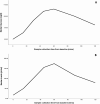Rate of Gestational Weight Gain and Glucose-Insulin Metabolism Among Hispanic Pregnant Women With Overweight and Obesity
- PMID: 34468745
- PMCID: PMC8764225
- DOI: 10.1210/clinem/dgab655
Rate of Gestational Weight Gain and Glucose-Insulin Metabolism Among Hispanic Pregnant Women With Overweight and Obesity
Abstract
Context: Hispanic women are at elevated risk of gestational glucose intolerance and postpartum type 2 diabetes compared with non-Hispanic White women. Identification of potentially modifiable factors contributing to this trajectory of beta-cell dysfunction is warranted.
Objective: We aimed to determine the association between rate of gestational weight gain (rGWG) and glucose-insulin metabolism in Hispanic pregnant women with overweight and obesity.
Methods: This cross-sectional, observational study, conducted from 2018-2020 at the clinical research center at University of California, Irvine, included 33 nondiabetic Hispanic pregnant women at 28 to 30 weeks' gestation with pre-pregnancy body mass index (BMI) 25.0 to 34.9 kg/m2. Participants consumed a standardized liquid mixed meal after an overnight fast. Serial blood samples were collected at fasting and up to 2 hours postprandial. The glucose and insulin area under the curve (AUC), insulin sensitivity index (ISI) and insulin secretion sensitivity index (ISSI)-2 were computed.
Results: Average rGWG (0.36 ± 0.22 kg/week) was classified as excessive in 60% of women. While rGWG was not associated with the glucose or insulin AUC or ISI, it accounted for 13.4% of the variance in ISSI-2 after controlling for covariates (maternal age, parity, and pre-pregnancy BMI); for each 1 unit increase in rGWG, ISSI-2 decreased 2.1 units (P = 0.015).
Conclusion: Even in the absence of gestational diabetes, rGWG was inversely associated with beta-cell function in a high-risk population of Hispanic pregnant women with overweight and obesity. Beta-cell decline is an established risk factor for transition to type 2 diabetes, and these cross-sectional findings highlight rGWG as a potentially modifiable contributor to this process.
Keywords: beta-cell function; gestational weight gain; glucose-insulin metabolism; insulin sensitivity; maternal overweight/obesity; pregnancy.
© The Author(s) 2021. Published by Oxford University Press on behalf of the Endocrine Society. All rights reserved. For permissions, please e-mail: journals.permissions@oup.com.
Figures
Comment in
-
The Impact of Gestational Weight Gain on Glucose and Insulin Physiology in Pregnancy-Does Timing Matter?J Clin Endocrinol Metab. 2022 Feb 17;107(3):e1303-e1304. doi: 10.1210/clinem/dgab745. J Clin Endocrinol Metab. 2022. PMID: 34634099 Free PMC article. No abstract available.
References
-
- Scholtens DM, Kuang A, Lowe LP, et al. ; HAPO Follow-up Study Cooperative Research Group; HAPO Follow-Up Study Cooperative Research Group . Hyperglycemia and Adverse Pregnancy Outcome Follow-up Study (HAPO FUS): Maternal glycemia and childhood glucose metabolism. Diabetes Care. 2019;42(3):381-392. - PMC - PubMed
-
- Yang X, Hsu-Hage B, Zhang H, Zhang C, Zhang Y, Zhang C. Women with impaired glucose tolerance during pregnancy have significantly poor pregnancy outcomes. Diabetes Care. 2002;25(9):1619-1624. - PubMed



